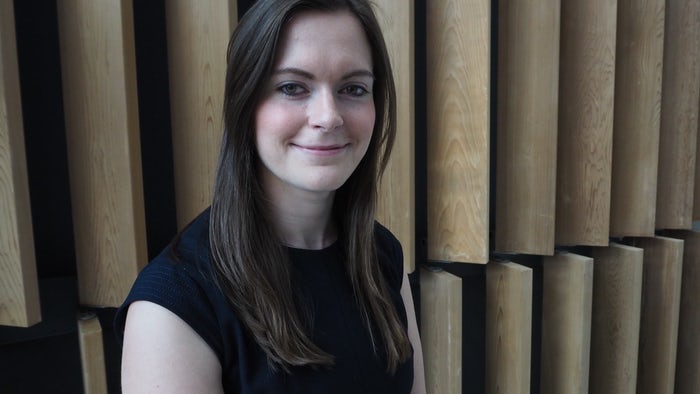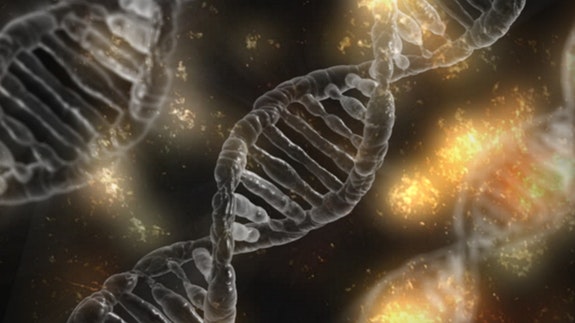16 May 2017
Neuroscientist breaks down Huntington’s disease stigma
A pioneering researcher at Cardiff University hopes to break down the stigma surrounding Huntington’s disease during this year’s HD awareness week campaign.

Dr Emma Yhnell, HD Research Fellow at NMHRI
Dr Emma Yhnell, a Research Fellow at the University’s Neurosciences and Mental Health Research Institute (NMHRI), is encouraging academics and the community to highlight the importance of research in battling this currently incurable condition.
Unlike any other neurodegenerative disorder, Huntington’s disease (HD) is caused by a single faulty gene which attacks the central nervous system and can ultimately affect a person’s ability to move, think, speak, feel and eat independently.
A hereditary condition, each child of a parent with HD has a 50% chance of inheriting the gene; it doesn’t skip a generation, so if a child tests positive they will, at some stage, develop the disease. It’s like tossing a genetic coin.
The annual campaign is organised by the national charity, Huntington’s Disease Association, which supports individuals affected by HD and their families.
Too often genetics overlooked
“It is the hereditary nature of HD that makes it so concerning for so many families,” said Dr Yhnell.
“Around 28,480 people live with a high genetic risk of inheriting HD in England and Wales. Yet, too often the genetic implications of this condition are overlooked and HD is frequently mistaken for other movement-related disorders such as Parkinson’s disease.
“It is not just the physical effects that can be so damaging to a person’s life – HD can leave people feeling isolated, lonely and in need of extra care, which in turn puts additional strain on families. We hope this month’s awareness campaign will help break down the stigma and misconceptions surrounding Huntington’s disease and raise awareness of the condition.”
The nature of this disorder means it damages nerve cells in the brain, with injury getting progressively worse over time and impacting everything from a person’s movement and cognition (perception, awareness, thinking, judgement) to behaviour.

Microscopic DNA gene
Translating research from paper to patients
Having completed her PhD in Huntington’s disease research in December 2015, Dr Yhnell secured a competitive Health and Care Research Wales fellowship to translate her pre-clinical findings to patients who are affected by HD.
“Working closely with patients is a key part of my role and I love feeling that I can make a real difference in people’s lives,” Dr Yhnell continued.
“The aim of my research is to find new therapies and interventions to help people who are living with this debilitating brain disorder.
“The single gene defect in Huntington’s means that we know exactly where the defect occurs and can target the gene when researching different therapies, whether it be brain training games, genetics work or exercise strategies.
“One of the therapies I’m researching is the use of computer games for improving thinking skills in patients who are affected by HD. Although brain games have been used in other brain diseases such as Parkinson’s disease and Alzheimer’s disease in the past, this is a first for studies in people with HD and my pre-clinical research shows good potential for taking this further.
“There is no better feeling than finally getting the results of an experiment that you have been working on for two years. More importantly, I believe this research is of utmost importance to improving the lives of thousands of families across the country.”
Protecting future generations
The awareness campaign is organised by the national charity, Huntington’s Disease Association, which is urging the nation to upload social media photos of their houses ‘lit up’ with candles and lanterns to put a spotlight on the need for HD research.
Dr Yhnell, who features on a list of Welsh women at the forefront of scientific innovation, added: “People affected by HD often say to me that getting involved in our research gives them a sense of investing in the protection of future generations.
“Not just for the wider community, but for their future families who may carry the gene. The work can be altruistic both for the participant and myself as a researcher.

Whether you have personal experience of HD or are simply interested in raising awareness of this little known condition, we urge everyone to visit the Cardiff University website to learn more about our potentially life-changing research.”
Cardiff University’s MRC Centre for Neuropsychiatric Genetics and Genomics runs a Wales Huntington’s disease Involving People Group, which consists of people affected by the disorder, their families and carers. The group works to improve research, communication and training, and is supported by Involving People, an organisation committed to encouraging patients’ active involvement in health and social care research in Wales.
- For more information into Cardiff University’s NMHRI work into cognitive training in Huntington’s disease, please contact nmhricomms@cardiff.ac.uk or tweet the centre @neurosciencecu.